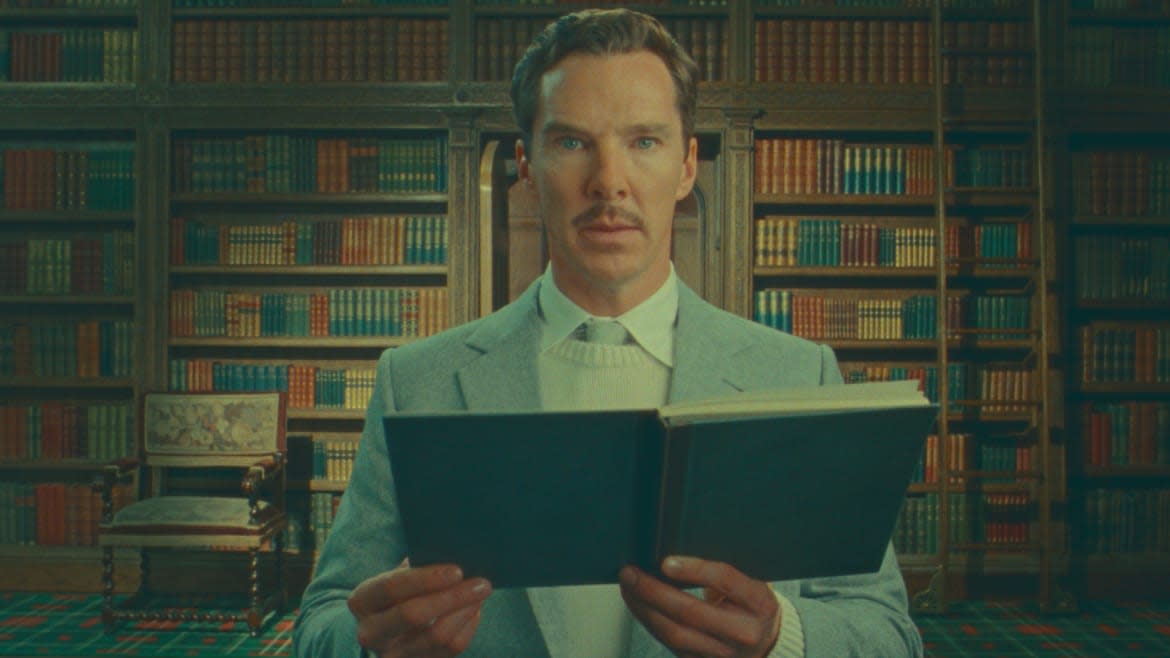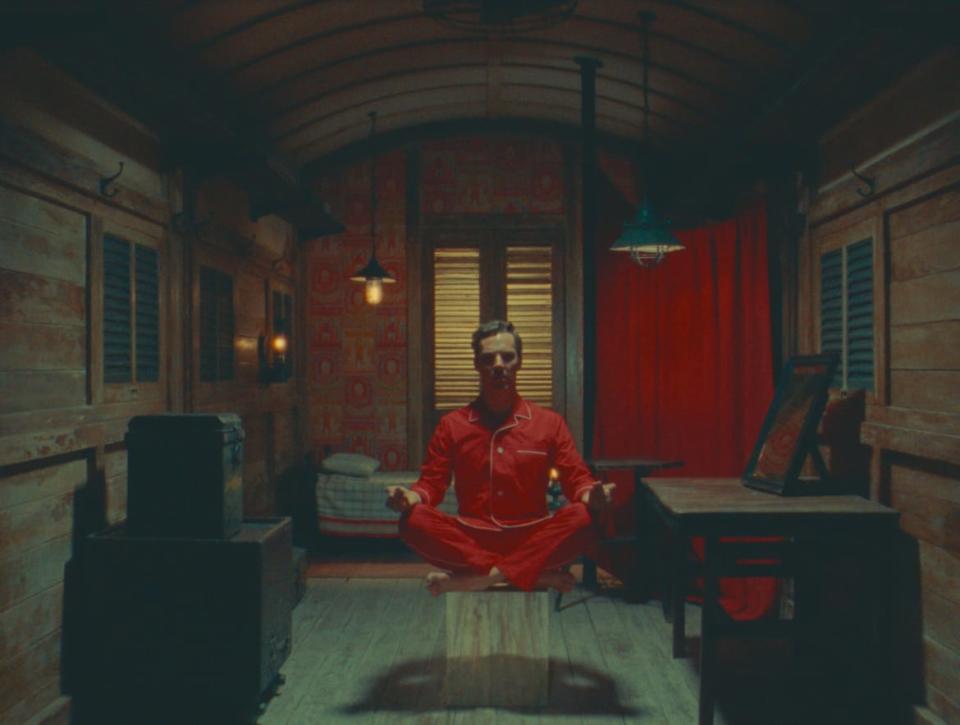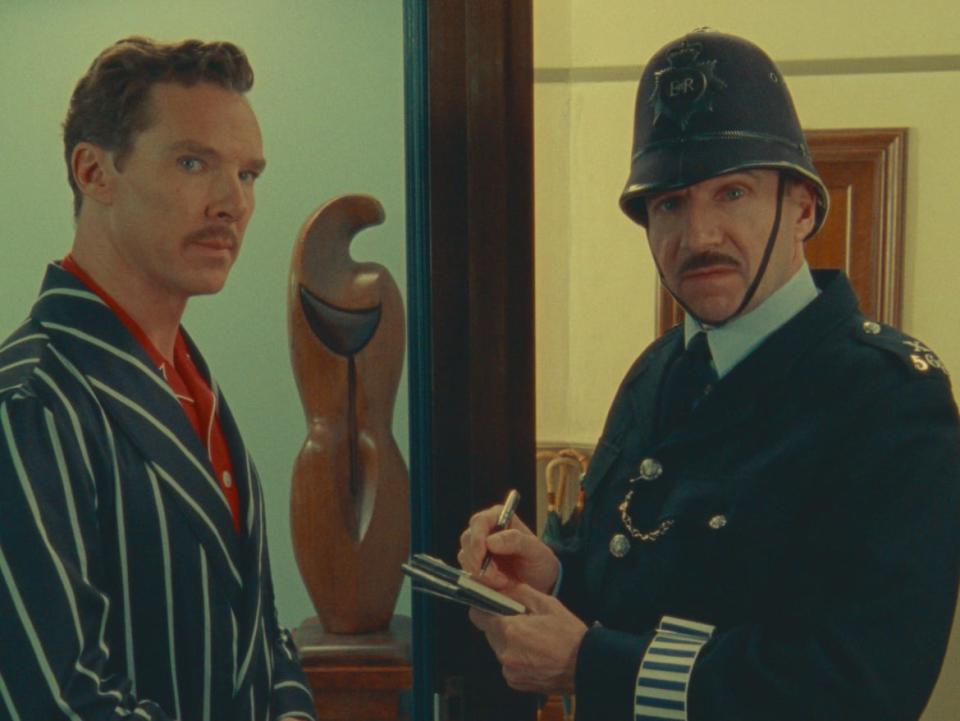Wes Anderson’s Roald Dahl Short ‘Wonderful Story of Henry Sugar’ Is One of His Best Works

- Oops!Something went wrong.Please try again later.
- Oops!Something went wrong.Please try again later.
For all his flights of fancy, Wes Anderson has always been a meticulously efficient filmmaker in terms of both style and substance, and The Wonderful Story of Henry Sugar (in theaters Sept. 20 and hitting Netflix on Sept. 27) is his most cleverly concise—as well as arguably his most thrilling—work to date. A 39-minute version of Roald Dahl’s 1977 story of the same name, and the first of four planned Dahl shorts he’s directing (this after he already helmed 2009’s stop-motion Fantastic Mr. Fox), the auteur’s latest takes a uniquely faithful approach to adaptation, even as it remains an electrifying act of cinematic showmanship. A beautiful and bountiful bite-size film, it stands as Anderson’s second triumph of 2023 (following June’s Asteroid City) and a mini-masterwork in its own right.
Anderson doesn’t merely channel Dahl’s prose in The Wonderful Story of Henry Sugar—he reproduces it, having various individuals pull double duty as characters and narrators. Speaking directly to the camera to recite third-person commentary and, also, their own dialogue, Anderson’s protagonists are all storytellers, and thus their tale becomes, in a certain sense, a celebration of storytelling. That notion is underscored by the self-consciousness of the entire endeavor, be it various figures breaking the fourth wall, diverse sets materializing and disappearing as if they were on a stage, animated backgrounds providing scenery for driving and outdoor walking sequences, or crew people literally adjusting actors around the frame as if they were mannequins.
The Wonderful Story of Henry Sugar revels in artifice because it’s about the wondrousness of fiction—even though its narrative is posited as a true story, save for the name of its main character. That would be Henry Sugar (Benedict Cumberbatch), who’s first described by Dahl himself (Ralph Fiennes) from a favorite chair in his study, its walls lined with pages and drawings and its nearby surfaces adorned with telephones and other knickknacks. Dahl explains that Henry is a 41-year-old whose wealth comes from his father (rather than his own toil) and whose bachelorhood is a result of his selfishness. He is, Dahl says, neither a good or bad man but “simply part of the decoration,” and as Dahl’s office gives way to the exterior of his Gipsy House and then to a regal mansion, he cedes the literal and verbal spotlight to Henry, who details the true origins of his extraordinary saga.
In a vast library, Henry discovers, and becomes enchanted by, a small blue exercise book about “The Man Who Sees Without Using His Eyes." This prompts The Wonderful Story of Henry Sugar to transition to 1935 Calcutta, where Dr. Chatterjee (Dev Patel) recounts this story-within-a-story, whose focus is Imdad Khan (Ben Kingsley). Having arrived in the city as part of a theater troupe, the aged Khan professes to have an amazing ability: He can see without the use of his eyes. To prove the legitimacy of his claim to audiences, Khan has visited Chatterjee and his partner Dr. Marshall (Richard Ayoade) to have his eyes professionally sealed. Fascinated by this feat (“I think we just witnessed a miracle”), which a head-bandaged Khan comically proves on his way out of the hospital, Chatterjee investigates further and learns the cause of Khan’s ability. Per its daisy-chain scripting, Anderson’s material consequently fixates on Khan as he relays his own journey from lowly performer to quasi-supernatural phenomenon—a transition facilitated by his encounter with a famed yogi who, in the lush jungle, teaches him his legendary meditative secret.

Before it reaches its conclusion, The Wonderful Story of Henry Sugar returns to Henry and his own quest to unlock Khan’s power, which he plans to use for less-than-altruistic purposes but which forever alters his nature and life’s course. Anderson’s short is, in its purest form, a crafty fable about greed and selflessness, and the way in which truths are seen and understood not with the body but via something deeper. In that last regard, however, it’s also about magic, and Anderson tells his tall tale with an inventiveness that itself is a delightful marvel to behold.
Painted and physical backdrops slide in and drop down from out of frame, revealing new surprises and milieus with sleight-of-hand sure-handedness and a healthy bit of humor. As they monologue, characters move between foreground and background, have make-up applied or removed, and segue between their roles as plot participants and omniscient chroniclers. It’s a picture-box playhouse fantasia that’s attuned to Dahl’s whimsical writing, and it’s no surprise that language, and the sound and feel of Dahl’s distinctive voice, is fundamental to this rat-a-tat-tat talky affair.

Anderson crams multiple yarns into The Wonderful Story of Henry Sugar, each one flowing freely from the other, and moving at a rapid-fire clip courtesy of his stars’ motormouthed line deliveries. That pace is vital to the proceedings’ spirit, as are the stellar performances of its illustrious cast. Cumberbatch’s fastidious screen persona is a natural fit for Anderson’s poised and manicured cinema, and Kingsley has a face that seems ideally made for one of the director’s colorfully ornate tableaus. Patel and Ayoade are drolly adept at handling the script’s gobs of gab, and Fiennes—in his second collaboration with Anderson, following The Grand Budapest Hotel—is pitch-perfect as the late children’s author. Everyone additionally plays both main and supporting parts, thereby amplifying the atmosphere of effusive imagination.
Wes Anderson Knows About the Memes and Has Thoughts
Anderson vacillates between aspect ratios and peppers his screenplay with countless mentions of numerical values, lending the film a simultaneous elasticity and exacting precision. The Wonderful Story of Henry Sugar finds the director in peak command of tone, structure and design, his every gesture and flourish calculated for maximum wit and charm. Magnifying glasses and x-ray machines provide up-close-and-personal views of that which cannot be spied with the naked eye, and yet there isn’t a moment when everything taking place isn’t compellingly clear. Blending the fantastical with the realistic (upon one important person’s death, another casually muses, “these things happen”), it’s a short that’s so ingenious and amusing that one almost wishes it wasn’t also quite so compact and self-contained, if only because spending more time in this universe would be, well, wonderful.
Liked this review? Sign up to get our weekly See Skip newsletter every Tuesday and find out what new shows and movies are worth watching, and which aren’t.
Get the Daily Beast's biggest scoops and scandals delivered right to your inbox. Sign up now.
Stay informed and gain unlimited access to the Daily Beast's unmatched reporting. Subscribe now.

